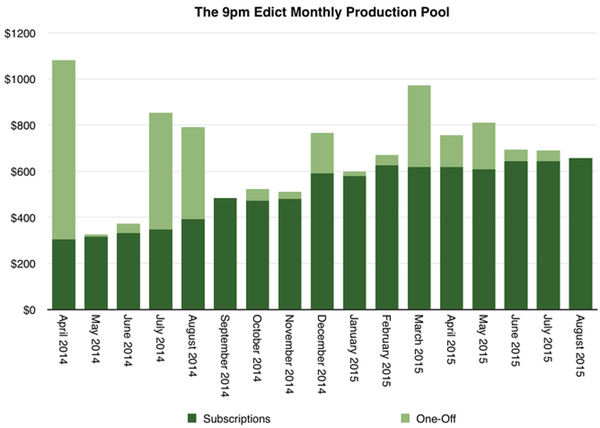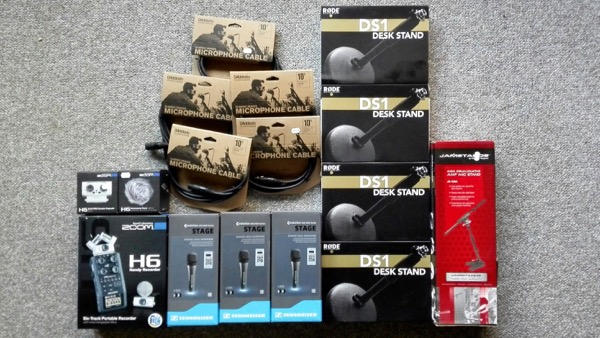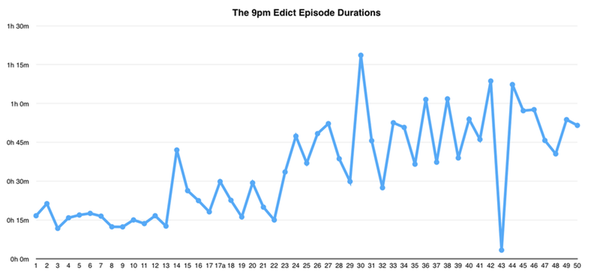Later this morning I’m being interviewed by Richard Aedy for next week’s episode of ABC Radio National’s Media Report about the success of my recent crowdfunding campaign, The 9pm Urgent Hardware Refresh. So I thought I’d put together some notes to clarify my thoughts.
The interview will be a follow-up to the one Aedy did in October 2013, Crowd funding an Australian freelancer – a case study, following the success of my first Pozible campaign.
First, let me say thank-you to the dozens and dozens of people who’ve been funding The 9pm Edict podcast since it was resurrected with an earlier Pozible crowdfunding campaign about 18 months ago. As this chart shows, continuing subscriptions are now running at around $700 per month.

There’s always a spike in new subscriptions, or one-off contributions, or both, when I can be bothered plugging the idea.
This chart doesn’t show the $7200-odd raised during The 9pm Urgent Hardware Refresh in August, because to do so would change the scale of the chart so much that it’d make it hard to read. But that new MacBook Pro, and the other new hardware pictured below, was vital to my continuing audio production. The budget spreadsheet (PDF) shows how that’s being spent.

Now $700 a month isn’t exactly a fortune when it comes to producing even one podcast per month, let alone several — especially when, as this chart shows, the episodes have gradually been getting longer.

But it’s clear to me that with just a little more effort — and considerably more focus! — I could increase that regular income substantially. So watch this space.
Some of the immediate lessons from The 9pm Urgent Hardware Refresh include:
- Focus and communication count for everything. Explain clearly what you want the money for, and what people get in return.
- Facebook is not the vital tool everyone says it is. I don’t even have a Facebook account. That said, I could probably expand my reach significantly if I did. I just don’t want to do business with those arseholes.
- Even though Pozible says you should make a video, it’s not absolutely necessary. Most of the contributors to this campaign didn’t even watch the video.
- People can be amazingly generous. Of the 88 people who contributed to this campaign, two of them gave $1000 or more and wanted nothing in return.
- Fans will pay for absolutely anything.
I’l have more to say next week. But the more I think about it, the more I think Kevin Kelly was right. To make a decent living from any creative venture, you need only about 1000 True Fans.
Media Report is on ABC Radio National on Thursday evening at 1730, repeated Friday morning at 0530, and it’s also on the program website. Today’s interview can he heard in next week’s episode, on 1 and 2 October.

Getting to those 1,000 fans is the trick (obviously). I am not a believer at all that the cream will rise to the top. Without a gatekeeper or influential supporter or three, creative output will likely languish down amongst the weeds.
Kickstarter/Pozible style funding is saturated and starting to move out of reach for many people, and the more campaigns you run as a small time creative, the greater the likelihood your campaign will not succeed because you begin to run the risk of alienating your closest fans who have already given so much. Subscription models (whether DIY or Patreon style) I feel are going to have an even shorter half life. It already feels like a model approaching saturation.
Crowdfunding, subscription models and whatever comes next are issues that have occupied my mind these past few months (for obvious reasons for those familiar with my wife’s music career).
And so I’m left pondering what is the third wave of patronage going to look like? I honestly don’t know. I suspect I need to spend more time with my history text books to work that one out.
Sorry to ramble in such an unstructured way. It’s been a long day. I had a point at the start but I fear I may have lost it along the way.
@Shane: I think we need to differentiate between the idea of patronage and the platform used to implement it.
Patronage by fans / philanthropists / like-minded individuals has always been a thing. Community (AU) / public (US) broadcasting is an obvious model, and one that’s been around a while.
Platforms for primarily one-off projects like Kickstarter / Pozible, or those for ongoing support like Patreon, simply provide a set of tools that make it easier to manage. And by gathering a bazillion unrelated projects in one place, you increase the chances of generous folks stumbling across something that they wouldn’t have seen otherwise.
I’m not sure what you mean by “Kickstarter/Pozible style funding [being] saturated”. Is it that Yet Another Young Filmmaker With A Film About Cricket (or whatever) is finding it harder to get supported by strangers, because those strangers have already felt the thrill of giving money to an unknown person?
If so, then that’s surely just because the important issue is finding your potential fans, turning them into actual fans, and communicating with them in the right style and at appropriate intervals. That’s the same kind of thing that community broadcasters have always done. The new media and social communications platforms and styles mean that it’s done a bit differently, the problem is still the same, I think.
Human nature and the psychology of support don’t change just because it happens on a smartphone.